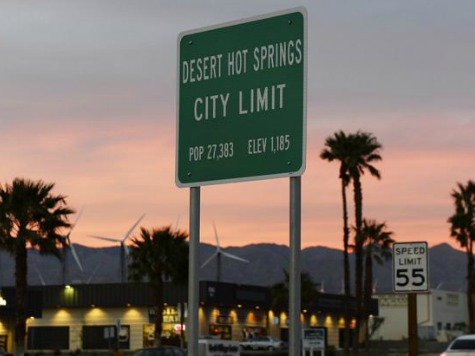Desert Hot Springs, California, north of Palm Springs, is desperately trying to avoid being the next California city to face bankruptcy, and the prime factor in the city’s dilemma is the huge shortfall in paying the pensions of its police force.
The fire department has already closed, and the small town of 27,000 is attempting to pay last springs’ budget of $7 million for the police force out of the total city budget of $10.6 million. An audit conducted prior to November’s elections showed the city was $4 million short and would run out of money by April 2014. Robert Adams, the acting city manager since August, said, “I would not venture to say they are overpaid. What I would say is that we can’t pay them.”
Last week, the new City Council voted unanimously to cut all city salaries by 22%, cap incentive pay, and lower the number of paid holidays and vacation days. Adams said that the cuts would still leave the city $2 million short by next June. But the police union protested that the cuts could hit some officers by as much as 40%. Wendell Phillips, a lawyer for the Desert Hot Springs Police Officers Association, immediately filed a fact-finding request with California’s Public Employment Relations Board, saying, “All they are going to end up doing is driving away their best, experienced officers and creating a police force made up of people who couldn’t get a job on another force.”
Adams said that the huge police pensions around California began when former Gov. Gray Davis offered them to the states’ prison guards. That was followed by the California Highway Patrol demanding the same pensions, and then city police officers from around the state. CalPERS, the huge state-run pension system which covers the employees of Desert Hot Springs, has consistently insisted that cities cannot reduce the pensions of public employees, even in the bankruptcies of Vallejo in 2008 and San Bernardino and Stockton in 2012.
In Desert Hot Springs, similar to other cities in California, police officers can retire at 50 after serving 30 years and receive 90% of their final salary every year. Desert Hot Springs’ police officers’ average pay and benefits package had been worth $177,203 per year. The median household income in Desert Hot Springs was $31,356 in 2011.
Desert Hot Springs went bankrupt in 2001 after losing a $10 million lawsuit to a developer who said the city would not let him build affordable housing. The city is still paying off that debt. In the 1980s the city, plagued by gang and drug problems, disbanded its police force and hired the Riverside County sheriff for law enforcement, but in 1997, the city reestablished its force. In 2009, the local police and the county sheriff made numerous arrests, slowing the gang and drug problem, prompting the hiring of a dozen more officers onto the small force, paid for with a new utilities use tax and a public safety tax.
The city is trying to resurrect its finances by revitalizing its spas, which sit on top of the city’s huge source of hot mineral water–famous for being unusually clear and odor-free. One spa, Two Bunch Palms, used to be a haven for Hollywood celebrities and global wellness tourists but was foreclosed on in 2010 and briefly closed. Now, a new team of Southern California investors has bought the property with hopes to revive and expand it.
New mayor Adam Sanchez said, “We must get back to marketing and promotion. We’ve got to return a sense of pride to Desert Hot Springs.”

COMMENTS
Please let us know if you're having issues with commenting.